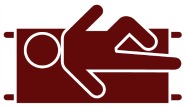A few years ago, I had a call about a patient coming in by ambulance as a stroke alert. Right side was flaccid, pt was aphasic. She had an the history of an old CVA some years prior, but after rehab, family said she no longer had deficits. I took the HEAR report and after listening to the patient's condition, I asked "Did you check a sugar?"
There was a moment of radio silence.
"We'll have that for you on arrival," was the response.
On arrival, I was told her capillary glucose at 24 mg/dl. An Amp of D50 started resolving her neuro deficits.
By the time she left, she walked out the door under her own power, laughing, talking and relieved that she wasn't facing a future of long and arduous stroke rehab.
This was just one of several cases I've seen over the years of hypoglycemia masking as a stroke. That's why protocol is to check blood sugar on every patient with an altered level of consciousness - regardless of diabetic history.
Yet, we often miss it. Sometimes we are more focused securing and protecting an airway, or getting IV access - when a quick check of the blood sugar with a finger stick could allow us to quickly identify and correct the underlying cause of the altered level of consciousness.
Hypoglycmia can present in patients with no diabetes history.
Alcohol can cause alterations in blood sugar, and too low or too high blood sugar can present as drunkeness.
Unilateral deficits don't often trigger thoughts of hypoglycemia in our minds. Yet the brain needs glucose just as much as it needs oxygenated blood to function. Cut off the glucose and brain cells can act just like they are experiencing ischemia.
Yet why would a patient present unilateral symptoms or hemiparesis if the whole brain is running low on glucose?
In my experience, the patients I've encountered with this presentation have often had some sort of ischemic event in their past. Collateral circulation may have allowed the brain to recover full function after the event, but starving the brain can affect the weakened tissue or impaired circulation.
What is collateral circulation? Think of a stroke as a wreck on the freeway, blocking traffic to a certain area of the brain. Collateral circulation refers to the smaller blood vessels that can be used as a detour when the freeway is blocked. Traffic - blood flow - goes to the local roads. In some circumstances, the body may even generate new blood vessels.
We have known about collateral circulation for some time, but we are still learning about how it works, and how we can use it to improve outcomes.
What about younger populations?
Newborns of course have limited reserves and can get hypoglycemic far too easily -- particularly if the mother had high blood sugars while pregnant. If a newborn goes too long without eating, hypoglycemia can present quickly. Sepsis, too, can cause a newborn to burn through its sugar reserves.
The first time you discover a type 1 diabetic, he or she is in DKA, with symptoms that can often be mistaken for viral illness or other conditions. Low blood sugar can cause seizures and so you should always check a sugar when you find a patient in a postictal state.
Bottom line, a finger stick blood sugar is an easy thing to check, a cheap test to do and may diagnose a easily treatable condition. So whenever a patient comes my way with altered mental status, don't be surprised to hear me ask "Did you check a blood sugar?"
Search This Blog
Subscribe to:
Post Comments (Atom)
If You Want to Make God Laugh...
Early on in the pandemic one of my daughters exclaimed "Covid ruins everything!" It became a running joke in our house, a bitter...

-
General Information about Burns One of the most painful injuries that one can ever experience is a burn injury. When a burn occurs to the...
-
Communications Communication is one of the most important tools in the medical profession. The better the communication, the better care ...
-
Droperidol / Inapsine is back in the Emergency Room. Is it safe? When I was a new nurse in the Emergency Room of a little coastal hospita...

No comments:
Post a Comment